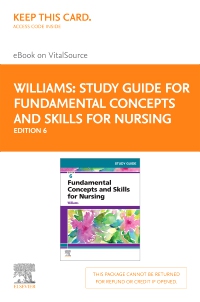
Study Guide for Fundamental Concepts and Skills for Nursing - Elsevier eBook on VitalSource (Retail Access Card), 6th Edition
Elsevier eBook on VitalSource - Access Card

Reinforce student understanding of basic nursing concepts and skills! Corresponding to the chapters in Fundamental Concepts and Skills for Nursing, 6th Edition, this study guide provides the review and practice your students need to master essential LPN/LVN knowledge. Engaging exercises and questions help in learning to apply the nursing process, set priorities, practice critical thinking, make good decisions, and communicate effectively. With this practical review, your students will get more out of the textbook and prepare for success on the Next Generation NCLEX-PN® exam.
-
- NEW! Updated exercises reflect content in the new edition of the Fundamental Concepts and Skills for Nursing textbook.
- NEW! UNIQUE! Next Generation NCLEX Exam-style questions are included in every chapter, reflecting the Clinical Judgment Measurement Model, and include each of the five new approved question types: enhanced hotspot, cloze (drop down), matrix, extended multiple-response, and extended drag-and-drop question types.
- Review Questions for the NCLEX-PN® Examination let students practice for the exam with multiple-choice and alternate item format questions based on real-life situations.
- Word Attack Skills offer practice in pronouncing difficult terms and phrases, with emphasis on stress and intonation.
- Clinical Situations use realistic sample practice situations to stimulate critical thinking, clinical judgment, and practical application of nursing concepts.
- Critical Thinking Activities provide nursing scenarios and questions to help students build problem-solving skills.
- Developing Clinical Judgment activities help students meet the clinical practice objectives of the corresponding chapter.
- Communication Exercises let students practice using realistic nurse-patient dialogues, and are especially useful when paired with a partner.
- Cultural Points summarize issues and ask questions about customs that may differ across the cultures found in patient communities.
- Grammar Points exercises offer a refresher on common grammatical errors, such as the use of the past tense in taking case histories.
- Completion exercises boost student vocabulary by offering more opportunities to use key terms.
- Priority Setting questions ask students to rank tasks in order of importance.
- Short answer, identification, multiple-choice, and matching questions test and reinforce student knowledge of concepts conveyed in the text.
- Application of the Nursing Process questions ask students to use critical thinking skills and apply the steps of the nursing process to real-life patient care.
- Review of structure and function of the human body helps students remember what they learned in previous classes and how it applies to nursing.
-
- NEW! Updated exercises reflect content in the new edition of the Fundamental Concepts and Skills for Nursing textbook
- NEW! UNIQUE! Next Generation NCLEX Exam-style questions are included in every chapter, reflecting the Clinical Judgment Measurement Model, and include each of the five new approved question types: enhanced hotspot, cloze (drop down), matrix, extended multiple-response, and extended drag-and-drop question types
-
1. Nursing and the Health Care System
2. Concepts of Health, Illness, Stress, and Health Promotion
3. Legal and Ethical Aspects of Nursing
4. The Nursing Process, Critical Thinking, and Clinical Judgment
5. Assessment, Nursing Diagnosis/Problem Identification, and Planning
6. Implementation and Evaluation
7. Documentation of Nursing Care
8. Communication and the Nurse-Patient Relationship
9. Patient Education and Health Promotion
10. Delegation, Leadership, and Management
11. Growth and Development: Infancy Through Adolescence
12. Adulthood and the Family
13. Promoting Healthy Adaptation to Aging
14. Cultural and Spiritual Aspects of Patient Care
15. Loss, Grief, and End-of-Life Care
16. Infection Prevention and Control: Protective Mechanisms and Asepsis
17. Infection Prevention and Control in the Hospital and Home
18. Safely Lifting, Moving, and Positioning Patients
19. Assisting with Hygiene, Personal Care, Skin Care, and the Prevention of Pressure Injuries
20. Patient Environment and Safety
21. Measuring Vital Signs
22. Assessing Health Status
23. Admitting, Transferring, and Discharging Patients
24. Diagnostic Tests and Specimen Collection
25. Fluid, Electrolyte, and Acid-Base Balance
26. Concepts of Basic Nutrition and Cultural Considerations
27. Nutritional Therapy and Assisted Feeding
28. Assisting with Respiration and Oxygen Delivery
29. Promoting Urinary Elimination
30. Promoting Bowel Elimination
31. Pain, Comfort, and Sleep
32. Complementary Health Approaches
33. Pharmacology and Preparation for Drug Administration
34. Administering Oral, Topical, and Inhalant Medications
35. Administering Intradermal, Subcutaneous, and Intramuscular Injections
36. Administering Intravenous Solutions and Medications
37. Care of the Surgical Patient
38. Providing Wound Care and Treating Pressure Injuries
39. Promoting Musculoskeletal Function
40. Common Physical Care Problems of the Older Adult
41. Common Psychosocial Care Problems of the Older Adult



 as described in our
as described in our 